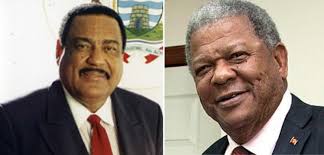 Two former Antigua and Barbuda Prime Ministers, Sir Lester Bird and Baldwin Spencer
Two former Antigua and Barbuda Prime Ministers, Sir Lester Bird and Baldwin Spencer
On May 29, 2017 two former Prime Ministers and leaders of opposing political parties in Antigua and Barbuda presented their nation’s parliament with one of those rare occasions in which in a fiery debate, they were ‘singing from the same hymn sheet’ as the saying goes.
The occasion was the introduction in the House of Assembly of a Bill that sought to make it compulsory for the beneficial shareholders of vehicles for financial transactions, including companies and Trusts, to be identified and for severe penalties to be applied when such information is withheld form regulatory authorities. The requirement for the Bill did not come from any local circumstances; it was a directive (euphemistically called ‘a recommendation’) from the Financial Action Task Force (FATF) and the Global Forum of the Organisation for Economic Co-operation and Development (OECD), that are the creations of the rich, industrialised nations to set global rules in financial matters.
The two former Prime Ministers were Sir Lester Bird of the Antigua and Barbuda Labour Party and Baldwin Spencer of the United Progressive Party. Both men have wide experience of superintending every aspect of their country’s affairs. In addition to being Prime Ministers - except for one brief period during Spencer’s administration - they retained the portfolio of foreign affairs. In this regard, they both had up-front and first- hand experience of the several – and unending – incursions in to the sovereignty of their nation by both the FATF and the OECD.
Given their knowledge of growing-up in a colony, where all the major decisions about their country were made in a distant and alien metropole, it is not surprising that both men place a high value on the autonomy that they consider their country achieved at its independence from Britain. So, the introduction of the Bill struck a chord with them. One might even say that the bill ‘stuck in their craw’; they appeared not to be able to swallow it easily if at all.
In this connection, they joined in a chorus of protest – Spencer’s belting to Bird’s timbre. Neither man would have the Bill passed; both saw it as an imposition by external forces that would further injure their nation’s financial services sector. Bird pointed to the continuing absence of a level playing field in the implementation of the FATF and OECD rules. He named powerful countries that ignored the rules they help make to impose on others. And, both former Prime Ministers thundered that the present government should stand-up against the unfairness of the system and simply refuse to accept dictation from the rich and powerful nations. Forlornly, it was suggested that CARICOM countries should jointly resist these impositions that disadvantage them and render them uncompetitive in the global financial system.
But, the reality is that the horse has already bolted on all of these matters; trying to close the stable door now will accomplish nothing except a black-listing by any jurisdiction courageous enough to do so.
When the opportunity for a solid CARICOM resistance to the FATF and OECD rules was ripe, governments failed to act in concert. In beggar-thy-neighbour policies in which countries sought to show that labels were being wrongly applied to them, there was little or no solidarity. Wider alliances with countries in similar circumstances in the Pacific, Africa, the Mediterranean and even Europe, were not effectively forged. As usual, divide and rule tactics were employed and they were effective. The consequence is that by consistent and clever policies, the governments that created the OECD and FATF have managed to impose rules that now ensnare the world. The system is an effective form of control by the powerful over the weak - cast in righteous and pious terms.
In this connection, the shared ire of Sir Lester Bird and Baldwin Spencer over yet another demand by the FATF and the OECD is understandable, but futile. Nothing short of a movement by many countries to wrest control of the rules governing the global financial system from the OECD countries and putting it where it has always properly belonged – the United Nations – can or will change the present unfair structure. Such a movement would require trust and confidence among the governments that initiate the action. It would also require political courage and non-partisan political support within countries. And the chances of that happening are utterly remote.
The present Antigua and Barbuda Prime Minister, Gaston Browne, was right, therefore, when he pointed to the consequences of non-compliance with the FATF and OECD rules. Antigua and Barbuda, acting alone, would be blacklisted as “un-cooperative” and appropriate penalties would be devised. For example, the current withdrawal of correspondent banking relations by US and UK banks would intensify and be adopted by other OECD governments, crippling the country’s economy. Already several countries in the Caribbean (including Barbados, The Bahamas, Belize, the six smaller Eastern Caribbean countries, Guyana, Haiti, Jamaica, Suriname, and Trinidad and Tobago) have lost correspondent banking relations from the US and the UK, and the costs of processimg international transactions have risen by as much as 300 per cent with no guarantee of continued service in the future.
The Antigua and Barbuda debate - with its blend of idealistic vexation at impositions on the country’s sovereignty and calm realism of its vulnerability – is probably replicated throughout the Caribbean. How these small states will survive in a global society, where power prevails over principle, will increasingly become the question of this Century for their political leaders, businessmen, diplomats and academics.